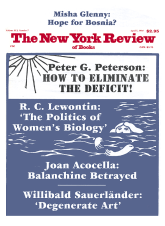In response to:
Shoot the Piano Player from the February 3, 1994 issue
To the Editors:
Sarah Kerr finds the happy ending of The Piano jolting, “a negation of everything that preceded it.” So, in a sense, it is. If Ada were an Emily Brontë heroine she could not find domestic happiness with Baines, any more than Catherine Linton could enjoy with Heathcliff the happiness of Elizabeth Bennett and Mr. Darcy. But I think she is wrong to conclude on this basis that the ending is an artistic error. The film is obsessed throughout with contradictions between romanticism and the wish for female autonomy, contradictions that inhabit many members of the film’s audience as surely as they do its heroine. Ada has been shaped by romantic scenarios of passion. These scenarios decree that a woman who gives herself to profound sexual passion will be drowned in it. (At the end of The Portrait of a Lady, the subject of Campion’s next film, Isabel, devotee of romantic fiction, rejects the passionate embrace of Caspar Goodwood because it feels like “a mighty sea, where she floated in fathomless waters.”) A woman must choose: either Pride and Prejudice or Wuthering Heights, either a love that respects the woman’s agency, but denies the centrality of sexual desire, or a love in which sexual desire eventually wastes and extinguishes the will.
Well, one might ask, why should this be? Why could one not give oneself to passion and discover that one’s will is after all going to choose life? And not only life, but joy? This is what Ada discovers—to her own great surprise—in the climatic underwater sequence. Convinced that her will has chosen death, she discovers in herself the desire for happiness. The sunlit ending that follows now has to be jolting and close to unconvincing—for it violates literary norms that are as deeply rooted in the audience as they are in Ada. But it is that very jolt that is the point: we are put on notice that the forms of expectation and desire generated in us by romanticism may have narrowed our sense of the possible.
What has made this ending possible all along—what has made it the only artistically coherent ending of this film—is the character of Baines, who from the beginning combines a brooding Heathcliff-like power with a genuine wish that Ada should speak, a somber romantic sexuality with a surprising tenderness and an odd respectfulness. Baines’s wishes, like Ada’s, are split—between the romantic desire to overwhelm her and the Kantian desire to make her a free gift of her own voice. Kerr speaks wryly of the “squat” body of Harvey Keitel. But for every woman I know who loves the film, this body is a central source of its interest. Powerfully muscled yet receptively soft, menacing yet generous, it renders convincing the thought that respect for autonomy may coexist with, and even motivate, the most passionate form of desire.
Is this true? Who can say. Meanwhile I know quite a few women who are going through old Keitel films, such as Bad Lieutenant and Reservoir Dogs, as if to find the answer to this urgent practical question.
Martha C. Nussbaum
Cambridge, Massachusetts
Sarah Kerr replies:
I thank Professor Pocock for his fascinating brief on the geography and history of New Zealand, and I agree with Professor Nussbaum: women need to seek the whole variety pack, not just one flavor. I also agree that the ending of The Piano is not an “artistic error” but an idea, and I think it is an idea that the last scene fails. The most arresting feature of the film up to this point has been the sex, and the most arresting feature of the sex that it occurs between two mercurial, glaring, and above all silent people—to be precise, between an inarticulate illiterate and a mute. There is a hostility to talking in these scenes, to feelings being expressed, to any of the usual means by which two people establish that they have not just sex but love, too. There is, in fact, a hostility to ideas. The sudden flash ahead to their perfect union is didactic and out of the blue, an unearned piece of wish fulfillment.
I meant no slight to Harvey Keitel (although I think his appeal is due to a soul charisma more than physique), and in fact Professor Nussbaum has reminded me of another film he did with a feminist theme and a troubling, emergency-exit finish. The film is Thelma and Louise, and in it Keitel plays a sensitive cop who is tracking two women on the lam. The proof of his sensitivity is that when the women come to the end of their ride and face certain arrest, rather than arresting them he chaperones their suicide over a cliff. This problem of the happy or sad ending is not unique to The Piano.
This Issue
April 7, 1994



